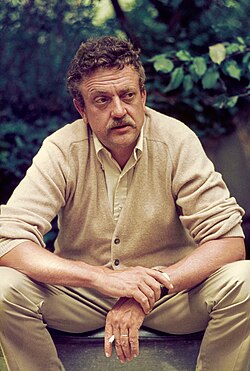Kurt Vonnegut Quote
In the beginning, God created the earth, and he looked upon it in His cosmic loneliness.And God said, Let Us make living creatures out of mud, so the mud can see what We have done. And God created every living creature that now moveth, and one was man. Mud as man alone could speak. God leaned close to mud as man sat up, looked around, and spoke. Man blinked. What is the purpose of all this? he asked politely.Everything must have a purpose? asked God.Certainly, said man.Then I leave it to you to think of one for all this, said God.And He went away.
Kurt Vonnegut
In the beginning, God created the earth, and he looked upon it in His cosmic loneliness.And God said, Let Us make living creatures out of mud, so the mud can see what We have done. And God created every living creature that now moveth, and one was man. Mud as man alone could speak. God leaned close to mud as man sat up, looked around, and spoke. Man blinked. What is the purpose of all this? he asked politely.Everything must have a purpose? asked God.Certainly, said man.Then I leave it to you to think of one for all this, said God.And He went away.
Tags:
meaning of life, purpose
Related Quotes
The alchemists of past centuries tried hard to make the elixir of life: ... Those efforts were in vain; it is not in our power to obtain the experiences and the views of the future by prolonging our l...
Hermann Franz Moritz Kopp
Tags:
alchemists, alchemy, effort, elixir, elixir of life, experience, historian, history, life, life extension
We have created a manic world nauseous with the pursuit of material wealth. Many also bear their cross of imagined deprivation, while their fellow human beings remain paralyzed by real poverty. We dro...
Anthon St. Maarten
Tags:
buying, consumer culture, consumerism, consumption, deprivation, desert, despair, emptiness, excess, happiness
About Kurt Vonnegut
Kurt Vonnegut ( VON-ə-gət; November 11, 1922 – April 11, 2007) was an American author known for his satirical and darkly humorous novels. His published work includes fourteen novels, three short-story collections, five plays, and five nonfiction works over fifty-plus years; further works have been published since his death.
Born and raised in Indianapolis, Vonnegut attended Cornell University, but withdrew in January 1943 and enlisted in the U.S. Army. As part of his training, he studied mechanical engineering at the Carnegie Institute of Technology and the University of Tennessee. He was then deployed to Europe to fight in World War II and was captured by the Germans during the Battle of the Bulge. He was interned in Dresden, where he survived the Allied bombing of the city in a meat locker of the slaughterhouse where he was imprisoned. After the war, he married Jane Marie Cox. He and his wife both attended the University of Chicago while he worked as a night reporter for the City News Bureau.
Vonnegut published his first novel, Player Piano, in 1952. It received positive reviews yet sold poorly. In the nearly 20 years that followed, several well regarded novels were published, including The Sirens of Titan (1959) and Cat's Cradle (1963), both of which were nominated for the Hugo Award for best science fiction novel of the year. His short-story collection, Welcome to the Monkey House, was published in 1968.
Vonnegut's breakthrough was his commercially and critically successful sixth novel, Slaughterhouse-Five (1969). Its anti-war sentiment resonated with its readers amid the Vietnam War, and its reviews were generally positive. It rose to the top of The New York Times Best Seller list and made Vonnegut famous. Later in his career, Vonnegut published autobiographical essays and short-story collections such as Fates Worse Than Death (1991) and A Man Without a Country (2005). He has been hailed for his darkly humorous commentary on American society. His son Mark published a compilation of his work, Armageddon in Retrospect, in 2008. In 2017, Seven Stories Press published Complete Stories, a collection of Vonnegut's short fiction.
Born and raised in Indianapolis, Vonnegut attended Cornell University, but withdrew in January 1943 and enlisted in the U.S. Army. As part of his training, he studied mechanical engineering at the Carnegie Institute of Technology and the University of Tennessee. He was then deployed to Europe to fight in World War II and was captured by the Germans during the Battle of the Bulge. He was interned in Dresden, where he survived the Allied bombing of the city in a meat locker of the slaughterhouse where he was imprisoned. After the war, he married Jane Marie Cox. He and his wife both attended the University of Chicago while he worked as a night reporter for the City News Bureau.
Vonnegut published his first novel, Player Piano, in 1952. It received positive reviews yet sold poorly. In the nearly 20 years that followed, several well regarded novels were published, including The Sirens of Titan (1959) and Cat's Cradle (1963), both of which were nominated for the Hugo Award for best science fiction novel of the year. His short-story collection, Welcome to the Monkey House, was published in 1968.
Vonnegut's breakthrough was his commercially and critically successful sixth novel, Slaughterhouse-Five (1969). Its anti-war sentiment resonated with its readers amid the Vietnam War, and its reviews were generally positive. It rose to the top of The New York Times Best Seller list and made Vonnegut famous. Later in his career, Vonnegut published autobiographical essays and short-story collections such as Fates Worse Than Death (1991) and A Man Without a Country (2005). He has been hailed for his darkly humorous commentary on American society. His son Mark published a compilation of his work, Armageddon in Retrospect, in 2008. In 2017, Seven Stories Press published Complete Stories, a collection of Vonnegut's short fiction.
